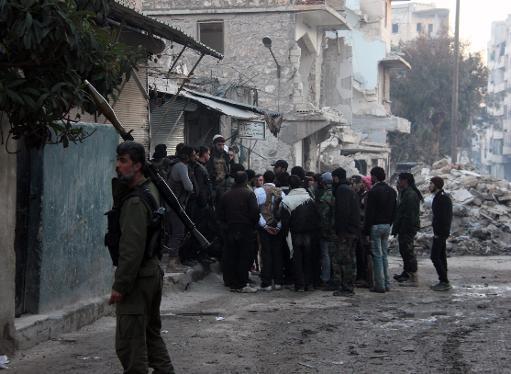An Al-Qaeda surge and Sunni-Shiite tumult spanning Iraq and Syria are testing eroded US influence and the logic of a foreign policy built on antipathy to Middle East entanglements.
The return of jihadists to cities like Fallujah and Ramadi, fabled battlefields for US soldiers, has left President Barack Obama facing charges he pulled troops home too soon from Iraq and squandered American sacrifices.
US intelligence agencies meanwhile worry that expanding havens for Al-Qaeda extremists in splintered Syria could nurture jihadists destined for terror missions in the United States and Europe.
Top US officials, led by Vice President Joe Biden, have been burning telephone lines to Baghdad, urging Shiite Prime Minister Nuri al-Maliki to reconcile with Sunni tribes in western Anbar province before assaulting jihadists from Al-Qaeda-linked Islamic State of Iraq and the Levant (ISIL).
The frantic US effort mirrors the White House's struggles to keep pace with revolution and disintegration from Egypt to Syria and Lebanon to Libya.
Washington wants Maliki to adopt a two-part strategy to check Al-Qaeda advances. First: reconcile with Sunni tribes. Then: take military action.
In effect, that is the strategy US forces used during their Iraq surge, which, in conjunction with a Sunni awakening, helped drive Al-Qaeda out.
But some here question whether fledgling Iraqi forces are capable of ousting militants from Fallujah, where Americans needed air support and some of their bloodiest fighting since Vietnam to prevail.
And in the two years since the final US troop carrier rolled out of Iraq, Washington has been frustrated that Maliki has not done more to cool the sectarian stew sent to boiling point by the US invasion in 2003.
Crises abroad are habitually viewed in myopic Washington as a US policy failure even if local factors are more significant.
American sacrifices were "squandered by an administration that wanted out and didn’t want to remain and consolidate the gains that were made through the sacrifice of American blood and treasure," said Republican Senator John McCain.
Obama’s critics blame him for failing to reach an agreement to keep a residual force in Iraq, which they say would have preserved US influence and prevented an Al-Qaeda return.
But could a small US force really have stemmed the sectarian tide?
"We have lost that leverage right now," said Max Boot, of the Council on Foreign Relations.

AFP/Medo Halab - Opposition fighters prepare to storm the headquarters of the jihadist Islamic State of Iraq and the Levant (ISIL) fighters in the Bab al-Neirab neighbourhood of the northern Syrian city of
"Those of us who were in favor of keeping troops after 2011 warned of what would happen. Unfortunately, I think our warnings have come to pass."
The White House disputes the idea a small US garrison could have stemmed the sectarian tsunami.
"When there were 150,000 US troops on the ground, there was a great deal of sectarian violence in Iraq," White House spokesman Jay Carney said.
Obama, who built his career on opposing the war, faces little political risk on Iraq in a nation weary of combat.
Many analysts also believe that the most blame for Iraq's torment lies with Maliki's failure to bed down a multi-ethnic government and the overflow of extremism from Syria.
But an Iraq that descends into a full-scale civil war scenario would blot Obama's legacy and undercut his claims he "ended the war."
Washington has promised to speed the delivery of Hellfire missiles and surveillance drones to Iraq, but some lawmakers fear Maliki could turn more robust weaponry, like attack helicopters, against domestic enemies other than Al-Qaeda.
While the CIA is reportedly offering intelligence and some military officers suggest training for Iraqi troops outside the country, there is little support for a more direct US role.
"It is their fight," Secretary of State John Kerry said.
US pressure on Maliki has raised another question -- how much influence does Washington have?
Critics say the US withdrawal, combined with both Obama's unwillingness to arm rebels in Syria and his decision to abort a strike on Damascus to punish the use of chemical weapons, has sent a message of disengagement.
"What’s odd to me is that our foreign policy is not focused on the Al-Qaeda threat that is growing," said Republican Senator Lindsey Graham.
Washington Post journalist David Ignatius, known for excellent contacts with US intelligence, argued in his latest column that in its rush to leave Iraq, the Obama administration allowed Iran to turn Maliki and Iraq into "virtual clients" and undercut US sway.
The White House is also watching developments in Syria with concern, where a fracturing of the opposition opened the door for Al-Qaeda advances.
Obama has been loath to insert US forces or weapons into the murderous conflict, but critics say he missed a chance to empower a more moderate opposition.
US intelligence agencies worry Al-Qaeda chiefs could recruit fighters of US origin and send them back home on terror missions.
"We are focused on trying to figure out what our people are up to, who should be spoken to, who should be followed, who should be charged," said FBI Director James Comey.
"It's something we are intensely focused on."















Comments About This Article
Please fill the fields below.